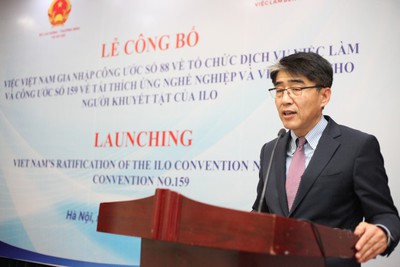 |
| Tim de Meyer, senior advisor on standards policy for International Labour Organization |
What are the most significant changes to the draft revised Labor Code? And what do these changes mean for the Vietnamese people?
- The Labor Code in Vietnam is a comprehensive document that deals with many issues, such as employment contracts, the ability of workers to negotiate with their employers, minimum standards for working conditions, the protection of safety and health and so on.
In all of these areas, the current revision process is contemplating significant changes. In my opinion, there are two particularly significant changes. One major change is the ability of workers, at the enterprise level, to form representative organizations and engage in a collective bargaining process that enables them to get a fair share of the profits they help generate and enables enterprises to negotiate necessary productivity improvements.
The other major change is the expansion of the scope of the Labor Code. This means many more workers than in the past will be in a position to benefit from the protection of the Labor Code.
Vietnam’s Labor Code now seems to be more in line with international labor standards. Can you explain how?
- I think the most significant progress toward better alignment with International Labor Standards is the right of employers and workers to organize, which means to form organizations representing them to engage in meaningful negotiations on working conditions. It is very meaningful because it will enable employers and workers to adjust to changes in the labor market and to negotiate the flexibility that is necessary to remain sustainable over a longer period of time.
We're also seeing progress in the employment relationship, which is firmly embedded in the Labor Code. The better the employment relationship is recognized as a means of protecting workers who work according to the instructions of an employer, the easier it becomes for workers to claim the protection of the Labor Code, as the employment relationship is the doorway to the Code. So we hope that it will be possible to align the situation in Vietnam with international standards, such as those on minimum wage, ensuring that a much larger number of workers will receive at least the minimum wage to sustain their families.
In your opinion, where is Vietnam placed in the world in terms of labor law development?
- Traditionally, Vietnam has an extensive system of laws on the books. However, the more conditions are added to the law and the more economic activity diversifies, the more difficult it becomes for everyone in the economy to live up to these standards. Therefore, the important transition Vietnam needs to make is to put more emphasis on contracts, enabling employers and workers, both individually and collectively, to negotiate working conditions that best fit their situation. So I think the change that Vietnam still needs to make is to stop focusing on adding more laws but ensuring the existing laws fit the needs of workers and employers.
What specific issues in the Code still have room for improvement?
- Issues related to the promotion of equality. We see inequality on the rise everywhere in the world today, particularly inequality of income but also inequality of opportunities.
Vietnam is an aging society, so one of the issues is that productivity must rise alongside skill levels to make the best of everyone’s productive potential. This means more women need to join the labor market in a way that rewards them fairly. However, a number of protective provisions in the Labor Code will then need to be revised.
Maternity protection needs to be strengthened; women also need access to affordable domestic work, protection from sexual harassment and a wider range of occupations and economic activities that traditionally have been closed to women for protective reasons. So I think this is an area in which the Labor Code can still make a fairly significant amount of progress. SGT
Truc Diem

Labour confederation proposes reducing working week to 44 hours
The Vietnam General Confederation of Labour (VGCL) has recommended cutting weekly working hours to 44 from the current 48, saying it would improve workers’ wellbeing, family life and relationship.

Vietnam joins two international conventions on labour
Vietnam has joined two technical conventions of the International Labour Organization (ILO) - Convention 88 on employment services and Convention 159 on vocational rehabilitation and employment for people with disabilities.
 It is not necessary to add more details on paper but to make sure that what is already on paper fits the needs of employees and employers, International Labour Organization (ILO) Senior Advisor on Standards Policy Tim De Meyer said.
It is not necessary to add more details on paper but to make sure that what is already on paper fits the needs of employees and employers, International Labour Organization (ILO) Senior Advisor on Standards Policy Tim De Meyer said.